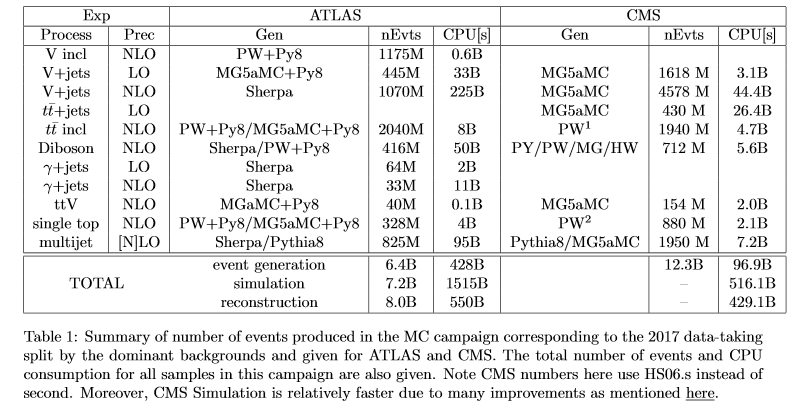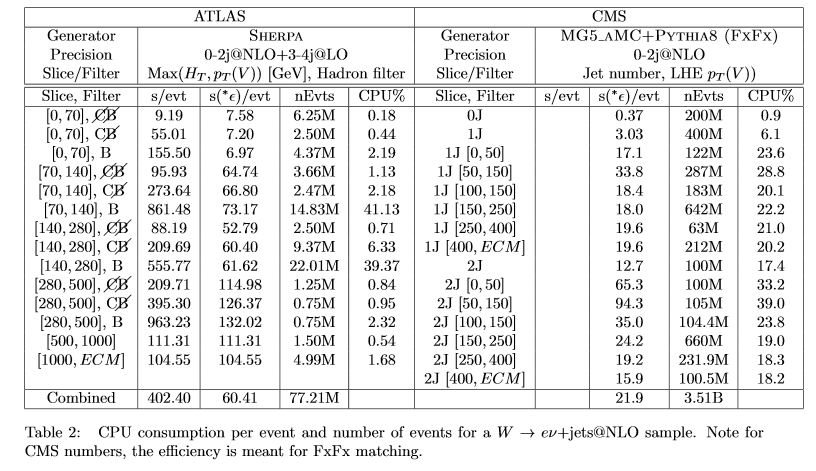HSF Generator Meeting #6, 27 June 2019
Agenda: https://indico.cern.ch/event/821205
Present/Contributors: Andrea Valassi, Stephen Jiggins, Josh McFayden, Zach Marshall, Qiang Li, Kyle Cormier, Javi Fernandez Menendez, Simone Amoroso, Alexander Grohsjean, Graeme Stewart, Steve Mrenna
General news / Josh
- Low attendance initially due to clash with Parton Shower Uncertainties workshop (https://indico.cern.ch/event/827858/)
- Propose to move from biweekly to monthly meetings
- Ideas for longer term activities after the ATLAS/CMS accounting?
- Andrea: preliminary to GPU/HPC port it would be nice to get a reproducible setup
ATLAS and CMS event generator update / Qiang and Josh
- Copied from the
note
attached to the indico agenda:
- CMS numbers in Table1 (Updates
marked in red):
- (1) Sample Statistics: 9.4->12.3B (we missed to count some samples)
- (2) Reminder: Time/Evt numbers from Computing Experts
- G+S = 50 sec /ev/core, D = 10 sec/ev/core, R = 25 sec/ev/core : Tot: 85sec/ev/core
- (3) GEN fraction: updates from
https://indico.cern.ch/event/804266/
- Old GEN fraction ~7.3% (1.41*0.05+1.96*0.17+0.43*0.05+1.94*0.04+0.712*0.05+0.154*0.05+0.876*0.05+1.95*0.05)/9.4
- New GEN fraction ~9.3% (1.62*0.05+4.58*0.17+0.43*0.05+1.94*0.04+0.712*0.05+0.154*0.05+0.876*0.05+1.95*0.05)/12.2
- Where 0.05, 0.17 and 0.04 ….are from numbers achieved from local tests.
- Thus for GEN we have 85*9.3%~7.9 sec/ev/core.
- And the total GEN CPUs is 7.9*12.26B~96.9B
- (4) In Table 1, we also provided GEN CPUs for each sample category:
- For example, DY MG MLM~1.9s/event for GEN step based on local tests, thus the total CPUs is 1.9*1618M=3.07B.
- Summing over the numbers we get in Table1 for each sample category, we get 95.5B, which is quite close to 96.9B
- ATLAS numbers (Josh)
- (1) Changes to numbers since last time came from two places:
- Double counting of a small number of samples
- Accidental removal of samples that should be included
- --> Relatively small effect
- (2) HS06s vs s
- All the ATLAS numbers are raw seconds. Would be preferable to have in HS06 seconds instead. Technically this is possible but will require relatively major update to the code, in the end it’s just a matter of finding the time to do it.
- (1) Changes to numbers since last time came from two places:
- For reference: current tables in
https://www.overleaf.com/1326158343ftxgrxxcspxg:
- Table 1

- Table 2

- Table 1
- CMS numbers in Table1 (Updates
marked in red):
- Qiang/CMS
- After update of statistics and reconstruction/digitisation/sim times, fraction of time for generation is now 9.3% for CMS compared to full MC production chain
- One relatively large sample is missing, will add this and make few other updates later
- Note that 9.3% for CMS and 17% for ATLAS is relative to full MC production chain only, not relative to the full Grid time. Andrea: should multiply both by around 50%? Josh: MC production is more like 70% for ATLAS.
- CMS has only one s/evt column in table 2 while ATLAS has two, because CMS does not have the B/C filters that ATLAS uses, which need an extra efficiency factor.
- Josh/ATLAS
- ATLAS numbers are in raw seconds, will try to get HS06 seconds but it will take time. For CMS these are probably also in real seconds, not HS06 seconds now. Andrea: it only makes sense to ask ATLAS to move to HS06 if also CMS can do it, we should have the same units at least. Qiang: will follow up with CMS computing.
- Andrea: why ttbar+jets LO missing for ATLAS even if so big for CMS? Josh: ATLAS chose not to generate these so far as they are largely covered by the Powheg production, but might generate these in the future using sherpa, which may also take quite some CPU time. Javi: for CMS this is used for SUSY analyses only for consistency, but for all other top analysis the ttbar inclusive is used.
Les Houches / Josh
- A lot of discussion on negative event weights in Les Houches (details in Josh’s slides)
- Also discussed standard test configurations (using docker), output
formats and GPU.
- There was not a huge amount of positivity about porting generators to GPUs…
ATLAS/CMS ttbar sample sharing / Kyle and Javi
- Slide 9: differences between ATLAS/CMS come mainly from showering (different Pythia settings), rather than from ME (different Powheg settings)
- Josh: would it be difficult to set up an EOS area for this?
Andrea: probably not, should investigate. Zach: there is also a
public EOS area that I have already used to share data with
theorists.
- Andrea: will follow up in CERN IT
- Andrea: are LHE files actually produced already? Josh: in ATLAS we do separate the two steps, first we produce LHE files and then we shower to full HepMC, but CMS probably does it differently (with LHE an internal format in memory). The timeshare is probably 50-50 % for a simple process like this.
Proposal for PDGID extension / Zach
- Zach: forwarded request to the CMS exotica conveners. Qiang: will do the same again.
AOB
- Next meeting in four weeks, to be confirmed (or even earlier if we have things to discuss)